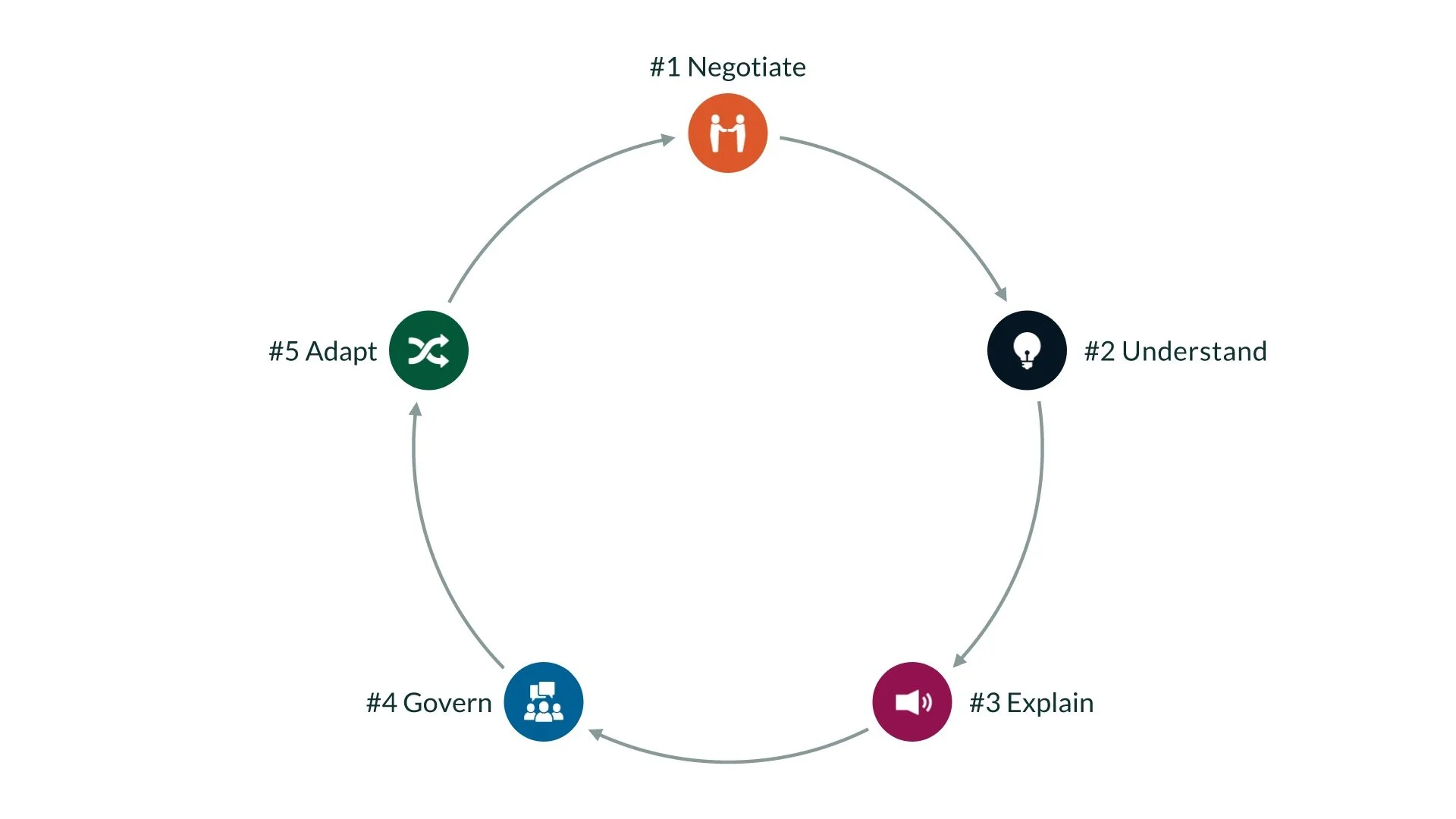The Competence Wheel
Written by Dr Christina J. Colclough, founder of The Why Not Lab. Published 2023
The Competence Wheel
Based on a municipality's wish to deploy digital technologies responsibly and knowledgably, the Why Not Lab has created the Competence Wheel - a 5 step journey to ensure fairness, transparency, empowerment and ownership over the digital technologies deployed.
Identifying the Problem
In this decentralised municipality, over 300 digital systems are in use - although some more than others. Most of the systems had been developed in each department independently from other departments. None of the current systems used artificial intelligence, machine learning or deep learning, yet the municipality expected such systems to be used sooner rather than later. Most of the systems are third party systems, developed either by the association of municipalities or by private companies.
The municipality was rather surprised by the number of digital systems they had, and they had no clear idea on what criteria the systems had been procured. Whilst the systems did support some decision making, the leadership also believed that they could benefit far more from evidence (data-driven) policy making than they already do.
Many of the department heads reported that the competencies to operate the systems were not widely shared, nor did the municipality have a digital strategy across departments. Realising the need to have a more coherent municipality-wide strategy to support policy making and to protect the generalised trust levels between citizens and the municipality, the Why Not Lab was tasked to offer some suggestions to support a transparent, inclusive and deliberate digital transformation in the municipality.
Deploying Digital Technologies Responsibly
Drawing on conversations with the working group as well as lessons learnt from public and private sector failures in the deployment of digital technologies, the Why Not Lab created the Competence Wheel - 5 key competencies that should be mainstreamed within and across all municipal departments. These competencies will ensure:
that digital technologies empower the public sector and the civil servants responsible for deploying them
that the use of digital systems is made transparent to the citizens together with clear lines of responsibility and points of contact
that relevant staff and political heads understand and can explain how the systems work, what their purpose is, and what rights those affected by the systems have
that all digital systems are periodically governed to ensure that rights are respected and (un)intended negative consequences identified and rectified
that all deployed systems can be adapted based on the outcomes of the governance
The Competence Wheel developed by the Why Not Lab
The 5 competencies in short
The 5 competencies are interrelated. One will strengthen the others and all depend on the others for a coherent and responsible digital deployment.
#1 - Negotiate: This competence has to do with the demands the municipality puts in the contracts with suppliers and procurement partners. Here it is important to negotiate for (1) joint data access and control, (2) stringent third party limitations on the repurposing of data derived from the systems, and (3) for the right to demand changes to the systems if harms or other negative outcomes are detected. This competence is strongly linked to the next one on understanding the systems.
#2 - Understand: To ensure that the civil servants and departments deploying the systems are the responsible parties, they must understand how the systems work, what data they are trained on, what the instructions are, and how the systems each the outcomes they do. This is not a given especially in machine learning systems, but at the same an essential competence if humans are to be the responsible agents.
#3 - Explain: The municipality must at all times be able to translate this understanding into coherent explanations of how the systems work and how outcomes have been reached. This competence is essential to protect citizen rights, to ensure inter-municipal learning and to uphold trust levels between citizens and the public sector.
#4 - Govern: The governance competencies relate to conducting impact assessments prior to deploying digital technologies as well as establishing governance bodies tasked with the responsibility of periodically governing the technologies for harms and other unintended or unwanted negative outcomes. These bodies must be inclusive, in other words consist of representatives of those who are subjects of the systems in addition to management and employees.
#5 - Adapt: How systems should be adapted will depend on the outcome of the governance stage. In addition, adaptation rights will depend on the contracts signed and whether in the negotiation stage the public authority has ensured they have the right to demand adaptations if harms or other negative outcomes are identified. At all times it must be the inclusive governance body who decides whether the technical adaptations are sufficient and acceptable. In other words, governance and adaptation responsibilities must never be a purely technical endeavour.
Working with the Competence Wheel
The competence wheel will be used to address the problems identified in the start of the project. In a form of centralised-decentralisation the municipality's various departments will be guided through the competence wheel in cooperation with a central team. The aim is to ensure that the employees and management team take control and ownership over the systems deployed and ensure that any third party systems are designed and run with citizens' rights and privacy at heart. For the citizens impacted by outcomes of these digital systems the outcome should be increased understanding of how the municipal decisions are made, on what basis, what their rights are and who to turn to with questions and queries. The Why Not Lab will be supporting the work in the municipality as they pursue the 5 competencies and the sub tasks under each.

